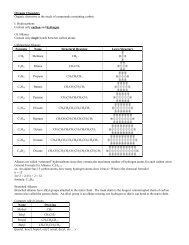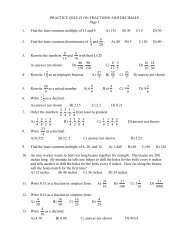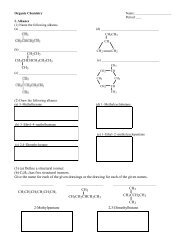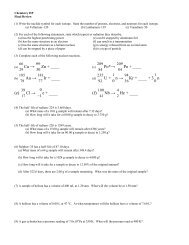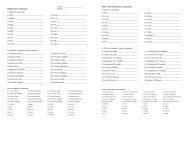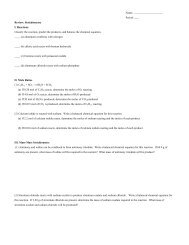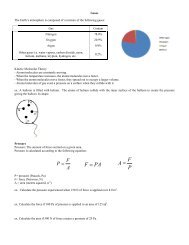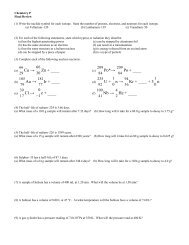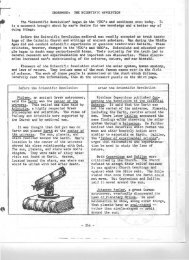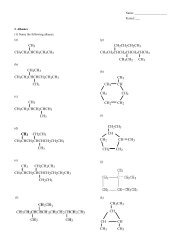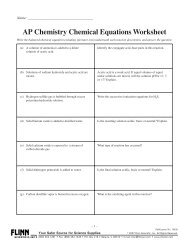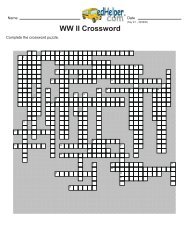his last year in office, TR went against business again, and supported heavier taxation of the rich andstronger business regulation.*The Election of 1908 and Taft’s Presidency*- Instead of running again, Teddy supported William Howard Taft for the Presidential Election of 1908[TR was reelected in 1904, by the way]. B/c of TR’s popularity, Taft won, but landed in a difficult situation.- First, Taft moved to cut tariffs, but was blocked by Progressives, who felt the tariff benefited specialinterests. So, the cuts were restored in the Payne-Aldrich Tariff (1909), which also angered Progressives.- Basically, Taft was caught in the middle of a rift between the conservative and Progressive wings of theRepublican Party. Not cool.- Then, when a group of Progressives challenged the conservative speaker, who controlled the legislativeprogress, Taft first supported and then abandoned them. He did, however, enlarge the Rules Committee,and therefore help the Progressives – but he pissed them off even more by firing conservationist Pinchot.- Basically, it would have stunk to be Taft. He did as much Progressive stuff as TR – he even busted moretrusts, signed the Mann-Elkins Act (1910), which helped the ICC powers and supported labor reforms, andhad the Sixteenth [in<strong>com</strong>e tax] and Seventeenth [direct election of Senators] <strong>Am</strong>endments passed. Butb/c he was cautious and wasn’t good at sucking up to people and the press, he didn’t get a good reputation.*The Election of 1912 and Wilson’s Presidency*- When TR got back from Africa, he realized that his party had split into the National ProgressiveRepublican League [La Follette] and the side that stayed loyal to Taft. Disappointed, he began speakingout, and eventually organized the Bull Moose Party [from the Progressives] when LF got sick.- Given that the Republicans had split, the Democrats knew they had a sure win, so they took their time andfinally picked Woodrow Wilson, who won the election. Wilson and TR had two <strong>com</strong>peting visions for thecountry, as follows: TR [New Nationalism] Let’s have a new era where the gov’t coordinates and regulates theeconomy. Big business can stay, but let’s protect people through <strong>com</strong>missions of experts thatwill serve the interests of consumers.Wilson [New Freedom] Let’s get rid of concentrated economic power altogether and makethe marketplace open for <strong>com</strong>petition. We won’t go back to laissez-faire, though; we’ll keepregulating it. But, no cooperation between business and gov’t. Based on Louis Brandeis.- Actually, though, the philosophies were very similar: both supported equality of opportunity, conservation,fair wages, social improvement for all, and a strong involved gov’t.- So how was Wilson as President? Issues he dealt with included…Anti-Trust Con’t – Well, given that mergers had proceeded so far, he ended up settlingw/expanding gov’t regulation w/the Clayton Anti-Trust Act (1914), which outlawedmonopolistic practices, and a bill creating the Federal Trade Commission (1914), whichcould investigate <strong>com</strong>panies and order them to stop unfair trade tactics.Banking Regulation – The Federal Reserve Act (1913) established another nat’l bank anddistrict banks [regulated by the Federal Reserve Board] that would lend $ to member banks atrates that could be adjusted to increase/decrease the $ in circulation – loosen/tighten credit.Right before the war he also passed the Federal Farm Loan Act, which allowed $ to be lent atmoderate interest to farmers.Tariffs – The Underwood Tariff (1913) encouraged imports [to help consumers] and instituteda graduated in<strong>com</strong>e tax on residents.Labor – The Adamson Act mandated an eight-hour-workday and overtime pay for RRDworkers; Wilson also regulated child labor and provided workers’ <strong>com</strong>pensation.- Then there was the Presidential Election of 1916, in which Wilson ran w/his “He Kept Us Out of War”deal against Republican Charles Hughes and won. In his second term, regulation increased even more dueto the war – the War Industries Board, for example. But after the war, regulation fell again. That’s all. OHMY GOSH, I’M REALLY TIRED NOW! How about you? Are you having fun or what?<strong>Am</strong>erican Imperialism (1865 – 1914)*The Causes of <strong>Am</strong>erican Imperialism*- Between the Civil War and WWI, <strong>Am</strong>erican foreign policy reflected a nation of expansionists andimperialists – cultural, economic, and otherwise. Of course, the US was not alone in this course of action:Germany, Great Britain, Japan, and other powers acted no differently.52
- So, what led the US to undertake its imperialist ventures? Generally, e/t foreign policy is determined by anelite group of leaders [instead of more directly by the people, as most people don’t give a crap], it really endsup reflecting the domestic climate of the country. So, the most relevant causes are as follows… ECONOMICALLY there were three main factors: Foreign Trade – The US reversed its unfavorable balance of trade for the first time in1874 due increasing agricultural and manufacturing exports. Since the livelihood of<strong>Am</strong>ericans was subsequently connected to world conditions, the US needed to havea strong foothold as a world power to protect its trading interests. The Search for New Marketplaces – The era was one of economic expansion, andmost of the leaders felt that expansion should know no borders, and that the gov’tshould help <strong>Am</strong>erican entrepreneurs abroad by using US power. Economic “Safety Valve” – In addition to the sheer profit motive from foreign sales,some feared [due to the crashes and such] that foreign <strong>com</strong>merce was needed as asafety valve to relieve economic woes like overproduction, etc. IDEOLOGICALLY & CULTURALLY there were several means of motivation/justification: <strong>Am</strong>erican Exceptionalism/Manifest Destiny – <strong>Am</strong>ericans have special qualities thatmake them, well, SPECIAL and deserving of taking over the world. Our values, ourideas…everything about us should be spread! Racism – Other races aren’t capable of self-government! Only we are, so we should“help” them out. To heck w/diplomacy – they aren’t worthy. Social Darwinism – And who says we shouldn’t reign triumphant? Darwin always saidthe best race would win out.Obsession with Masculinity – Self-explanatory.Missionary/Civilizing Impulse – In other words, the “nice” version of <strong>Am</strong>ericanExceptionalism (the idea that we’re special). The missionaries just made it all godlyand altruistic and everything, as many really believed that they were benefiting thepeople they subjugated b/c they were giving them “liberty” and “prosperity.”- Enough of that. Now what the heck actually happened?*US <strong>Am</strong>bitions Abroad: 1860 – 1880*- The <strong>Am</strong>erican empire grew slowly over time, prompted by leaders like William H. Seward [NY Senator,Secretary of State 1861 – 1869], who saw a huge US empire including Canada and surrounding islands.This empire, he thought, would <strong>com</strong>e together naturally through gravitation towards the US and trade.- Some of Seward’s schemes included… Virgin Islands – He tried to buy them from Denmark in 1867, but the Senate and a hurricaneprevented the purchase. Samaná Bay Naval Base – Attempt to get a base in the Dominican Republic, didn’t work. Intervention in Mexico – Using the Monroe Doctrine, Seward sent troops to the Mexican borderin 1866 and got Napoleon III to abandon its puppet regime there. Alaska – In 1867 Seward bought resource-rich Alaska from Russia. A Worldwide Communication System - Due to the financier Cyrus Field, a transatlantic cablewas built to link European and <strong>Am</strong>erican telegraph networks. This network was then extendedto Latin <strong>Am</strong>erica as well.- Other important trends in foreign policy under Seward & Fish [his successor]: Anglo-<strong>Am</strong>erican Rapprochement – During this time GB and the US grew closer. Examples ofthis shocking new phenomenon include…The Alabama claims – The Alabama and such ships were built for the Confederacyby GB. As they caused Union losses, the US demanded reparations, and thequestion was eventually resolved through a British tribunal that decided on theamount paid to the US.Open Sea Sealing – Yeah, they made a treaty about seals. Wow.Samoa – In 1878 the US gained rights to a coaling station in the port of Pago Pago.So, when GB & Germany tried to get into the action, the US got mad and told them tostay out, which got the Germans pissed. Tension grew until a three-part protectoratewas decided on in 1889 [w/o asking the Samoans though] dividing the country into<strong>Am</strong>erican Samoa and Western Samoa [Germany]. GB got islands instead.Sino-<strong>Am</strong>erican Problems – In addition to having problems w/Germany, the US soon hadissues w/China due to their hatred of US missionaries and business leaders. Chinese dislike of<strong>Am</strong>erica was <strong>com</strong>pounded by riots against Chinese immigrants in the west and suspension ofChinese immigration starting in the 1880s.53
- Page 3 and 4: Congregationalists (Puritans) - The
- Page 5 and 6: - So the Restoration Colonies, form
- Page 7 and 8: - So in England, where they were lo
- Page 9 and 10: *Colonial Politics 1700-1750: Relat
- Page 11 and 12: - Another ideology that was beginni
- Page 13 and 14: - The Quebec Acts were passed aroun
- Page 15 and 16: - So, by 1782, what had seemed to b
- Page 17 and 18: on the economic side, since the gov
- Page 19 and 20: - Anyway, Congress had several ques
- Page 21 and 22: - Adams was still in the early Wash
- Page 23 and 24: *Political Factionalism and Jeffers
- Page 25 and 26: - Samuel Slater set up the first te
- Page 27 and 28: - Court rulings extended the powers
- Page 29 and 30: Revival, Reform and Politics during
- Page 31 and 32: - Anyhow, during his administration
- Page 33 and 34: TEXAS (Southerners) - Texas had bee
- Page 35 and 36: - Anyhow, Pierce’s total support
- Page 37 and 38: They had a smaller everything: smal
- Page 39 and 40: - The two Northern victories at the
- Page 41 and 42: - The result was the Fourteenth Ame
- Page 43 and 44: The Slaughter-House Cases (1873) -
- Page 45 and 46: in the arrest of 8 immigrant radica
- Page 47 and 48: case (1897 - ICC can’t set rates)
- Page 49 and 50: - The Populists prepared to run aga
- Page 51: - MOST IMPORTANTLY, though, was the
- Page 55 and 56: - The rebellion, led by Emilio Agui
- Page 57 and 58: - Still, Americans managed to turn
- Page 59 and 60: - So - the point of this episode? B
- Page 62 and 63: *Hoover’s Response*- Poor Herbert
- Page 64 and 65: - In FDR’s second term, however,
- Page 66 and 67: Dominican Republic - When we left i
- Page 68 and 69: World War II (1941 - 1945)*The Cour
- Page 70 and 71: - So Truman started off again all c
- Page 72 and 73: - First of all, the 1950s were (for
- Page 74 and 75: peace w/Japan that ended occupation
- Page 76: - France wanted out, so at the Gene



